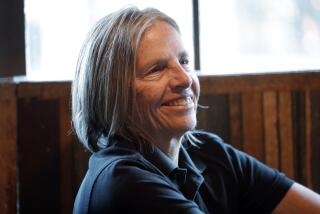Literary Deconstruction
- Share via
I have read the article “UCI Will Try Deconstructing With Yale Critic” (by Lynn Smith, March 9) with skepticism. The whole movement (deconstruction) seems to destroy, I believe, the concept of poetry and literature. Here we have teachers of poetry and literature who don’t believe in either poetry or literature.
Let us take a few examples. “. . . Jacques Derrida noticed that Plato repeatedly used a Greek word, pharmakos , which means both remedy and poison. Derrida’s conclusion was that the meaning of Plato’s work was ‘undecidable.’ ” It seems to me that Plato’s work is not “undecidable” because one can always tell the meaning in the light of the context. When Plato speaks of Socrates’ death “eile ton pharmakon, “ the word only means poison.
Another example. According to Ray Catalano (of UCI, explaining) deconstruction, “the artistic use of literature is something to be studied like the way you would study a human heart. . . . I guess you could say Hillis Miller is to Norman Mailer what a molecular biologist is to a physician. One level higher.”
I think that poetry and literature disappear when they are treated this way. Let us take Shakespeare’s verses, “My bounty is as boundless as the sea,/My love is as deep. . . .” In these verses Shakespeare reaches perfection and beauty, but if one dissects the verses logically, the whole beauty disappears: certainly a human love can never be as deep as the sea, because the human heart cannot be as immense as the sea. It is this lack of dissection that makes the verses great poetry.
I think that the whole movement is nothing but a search for novelty. Some people feel that they have to find something new every day, a search which gives vent to their frustrations, but it does not contribute to the world of truth.
I am a professor of romance languages and philosophy at Loyola Marymount University of Los Angeles. I have written two books on Croce and 36 articles on literary theory and criticism in scholarly journals. My most recent book (the Philosophical Library, 1986) is “The Reader’s Companion to Dante’s Divine Comedy.” It is a critical analysis of the great Italian poet.
ANGELO A. De GENNARO
Los Angeles
More to Read
Sign up for our Book Club newsletter
Get the latest news, events and more from the Los Angeles Times Book Club, and help us get L.A. reading and talking.
You may occasionally receive promotional content from the Los Angeles Times.






